MGT301A: Ethics and Sustainability Report - Issue Analysis
VerifiedAdded on 2023/06/03
|8
|2446
|354
Report
AI Summary
This report delves into ethical issues and sustainability within modern organizations, focusing on workplace discrimination and resource exploitation. It applies the Consequentialist framework to address discrimination, emphasizing the negative outcomes of such practices and advocating for equal opportunities and diversity. The Duty framework is used to tackle resource exploitation, highlighting the importance of environmental responsibility and sustainable practices. The report further reflects on how professional ethics, senior management, corporate governance, and organizational culture influence individual behavior. It concludes by emphasizing the role of ethical codes of conduct in fostering an ethical organizational culture. Desklib offers a wealth of similar solved assignments and past papers for students seeking comprehensive study resources.
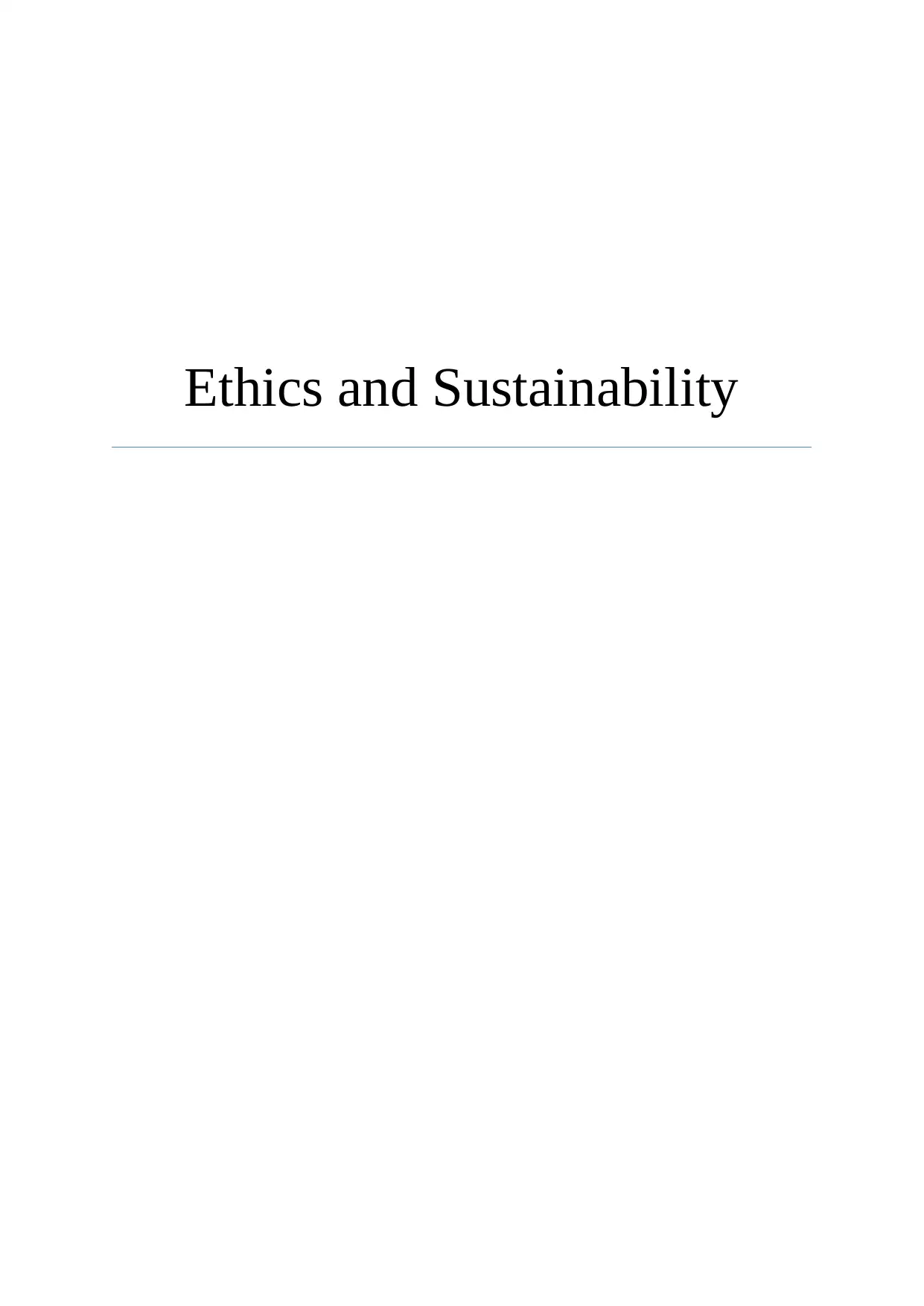
Ethics and Sustainability
Paraphrase This Document
Need a fresh take? Get an instant paraphrase of this document with our AI Paraphraser
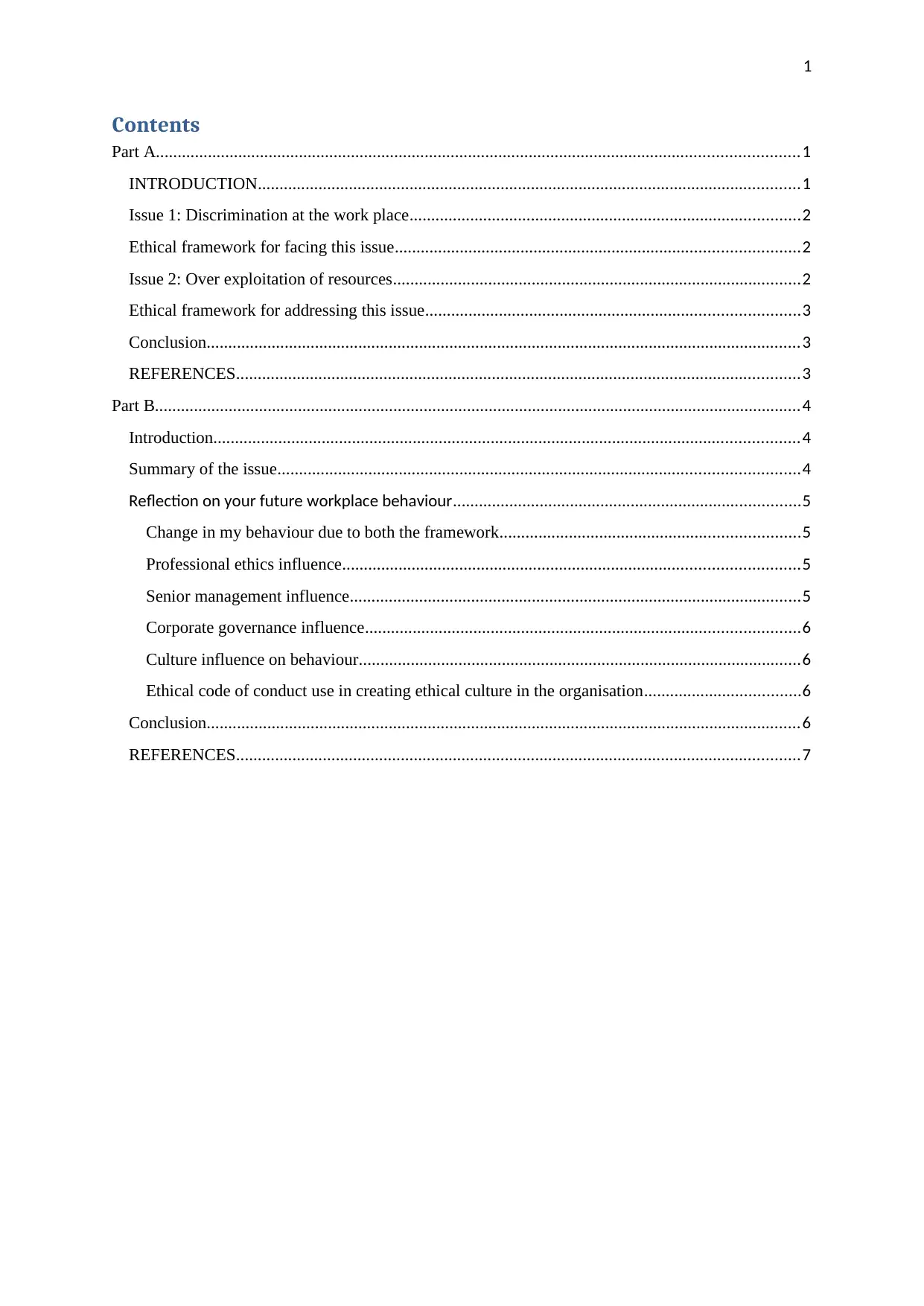
1
Contents
Part A....................................................................................................................................................1
INTRODUCTION.............................................................................................................................1
Issue 1: Discrimination at the work place..........................................................................................2
Ethical framework for facing this issue.............................................................................................2
Issue 2: Over exploitation of resources..............................................................................................2
Ethical framework for addressing this issue......................................................................................3
Conclusion.........................................................................................................................................3
REFERENCES..................................................................................................................................3
Part B.....................................................................................................................................................4
Introduction.......................................................................................................................................4
Summary of the issue........................................................................................................................4
Reflection on your future workplace behaviour................................................................................5
Change in my behaviour due to both the framework.....................................................................5
Professional ethics influence.........................................................................................................5
Senior management influence........................................................................................................5
Corporate governance influence....................................................................................................6
Culture influence on behaviour......................................................................................................6
Ethical code of conduct use in creating ethical culture in the organisation....................................6
Conclusion.........................................................................................................................................6
REFERENCES..................................................................................................................................7
Contents
Part A....................................................................................................................................................1
INTRODUCTION.............................................................................................................................1
Issue 1: Discrimination at the work place..........................................................................................2
Ethical framework for facing this issue.............................................................................................2
Issue 2: Over exploitation of resources..............................................................................................2
Ethical framework for addressing this issue......................................................................................3
Conclusion.........................................................................................................................................3
REFERENCES..................................................................................................................................3
Part B.....................................................................................................................................................4
Introduction.......................................................................................................................................4
Summary of the issue........................................................................................................................4
Reflection on your future workplace behaviour................................................................................5
Change in my behaviour due to both the framework.....................................................................5
Professional ethics influence.........................................................................................................5
Senior management influence........................................................................................................5
Corporate governance influence....................................................................................................6
Culture influence on behaviour......................................................................................................6
Ethical code of conduct use in creating ethical culture in the organisation....................................6
Conclusion.........................................................................................................................................6
REFERENCES..................................................................................................................................7
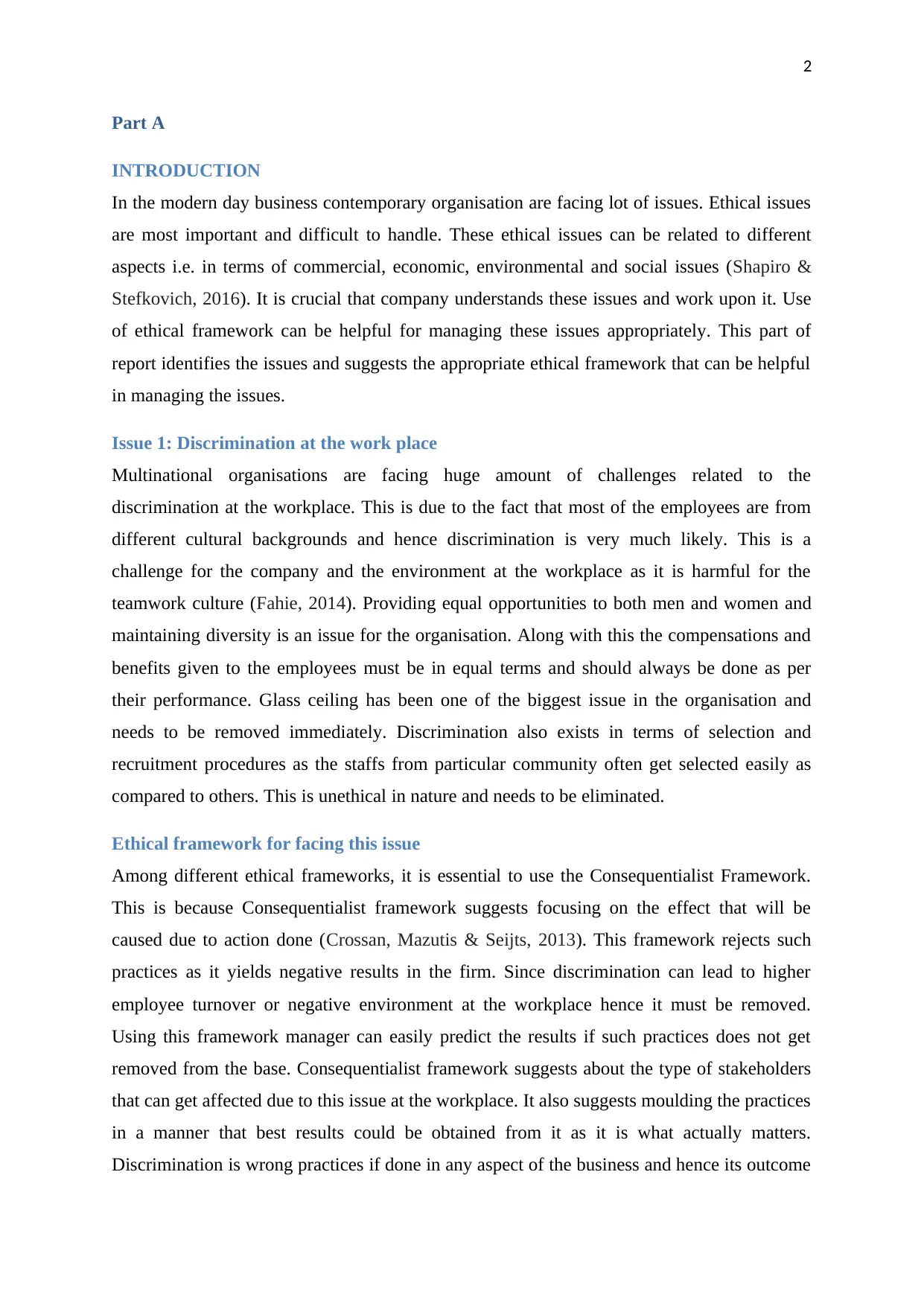
2
Part A
INTRODUCTION
In the modern day business contemporary organisation are facing lot of issues. Ethical issues
are most important and difficult to handle. These ethical issues can be related to different
aspects i.e. in terms of commercial, economic, environmental and social issues (Shapiro &
Stefkovich, 2016). It is crucial that company understands these issues and work upon it. Use
of ethical framework can be helpful for managing these issues appropriately. This part of
report identifies the issues and suggests the appropriate ethical framework that can be helpful
in managing the issues.
Issue 1: Discrimination at the work place
Multinational organisations are facing huge amount of challenges related to the
discrimination at the workplace. This is due to the fact that most of the employees are from
different cultural backgrounds and hence discrimination is very much likely. This is a
challenge for the company and the environment at the workplace as it is harmful for the
teamwork culture (Fahie, 2014). Providing equal opportunities to both men and women and
maintaining diversity is an issue for the organisation. Along with this the compensations and
benefits given to the employees must be in equal terms and should always be done as per
their performance. Glass ceiling has been one of the biggest issue in the organisation and
needs to be removed immediately. Discrimination also exists in terms of selection and
recruitment procedures as the staffs from particular community often get selected easily as
compared to others. This is unethical in nature and needs to be eliminated.
Ethical framework for facing this issue
Among different ethical frameworks, it is essential to use the Consequentialist Framework.
This is because Consequentialist framework suggests focusing on the effect that will be
caused due to action done (Crossan, Mazutis & Seijts, 2013). This framework rejects such
practices as it yields negative results in the firm. Since discrimination can lead to higher
employee turnover or negative environment at the workplace hence it must be removed.
Using this framework manager can easily predict the results if such practices does not get
removed from the base. Consequentialist framework suggests about the type of stakeholders
that can get affected due to this issue at the workplace. It also suggests moulding the practices
in a manner that best results could be obtained from it as it is what actually matters.
Discrimination is wrong practices if done in any aspect of the business and hence its outcome
Part A
INTRODUCTION
In the modern day business contemporary organisation are facing lot of issues. Ethical issues
are most important and difficult to handle. These ethical issues can be related to different
aspects i.e. in terms of commercial, economic, environmental and social issues (Shapiro &
Stefkovich, 2016). It is crucial that company understands these issues and work upon it. Use
of ethical framework can be helpful for managing these issues appropriately. This part of
report identifies the issues and suggests the appropriate ethical framework that can be helpful
in managing the issues.
Issue 1: Discrimination at the work place
Multinational organisations are facing huge amount of challenges related to the
discrimination at the workplace. This is due to the fact that most of the employees are from
different cultural backgrounds and hence discrimination is very much likely. This is a
challenge for the company and the environment at the workplace as it is harmful for the
teamwork culture (Fahie, 2014). Providing equal opportunities to both men and women and
maintaining diversity is an issue for the organisation. Along with this the compensations and
benefits given to the employees must be in equal terms and should always be done as per
their performance. Glass ceiling has been one of the biggest issue in the organisation and
needs to be removed immediately. Discrimination also exists in terms of selection and
recruitment procedures as the staffs from particular community often get selected easily as
compared to others. This is unethical in nature and needs to be eliminated.
Ethical framework for facing this issue
Among different ethical frameworks, it is essential to use the Consequentialist Framework.
This is because Consequentialist framework suggests focusing on the effect that will be
caused due to action done (Crossan, Mazutis & Seijts, 2013). This framework rejects such
practices as it yields negative results in the firm. Since discrimination can lead to higher
employee turnover or negative environment at the workplace hence it must be removed.
Using this framework manager can easily predict the results if such practices does not get
removed from the base. Consequentialist framework suggests about the type of stakeholders
that can get affected due to this issue at the workplace. It also suggests moulding the practices
in a manner that best results could be obtained from it as it is what actually matters.
Discrimination is wrong practices if done in any aspect of the business and hence its outcome
⊘ This is a preview!⊘
Do you want full access?
Subscribe today to unlock all pages.

Trusted by 1+ million students worldwide
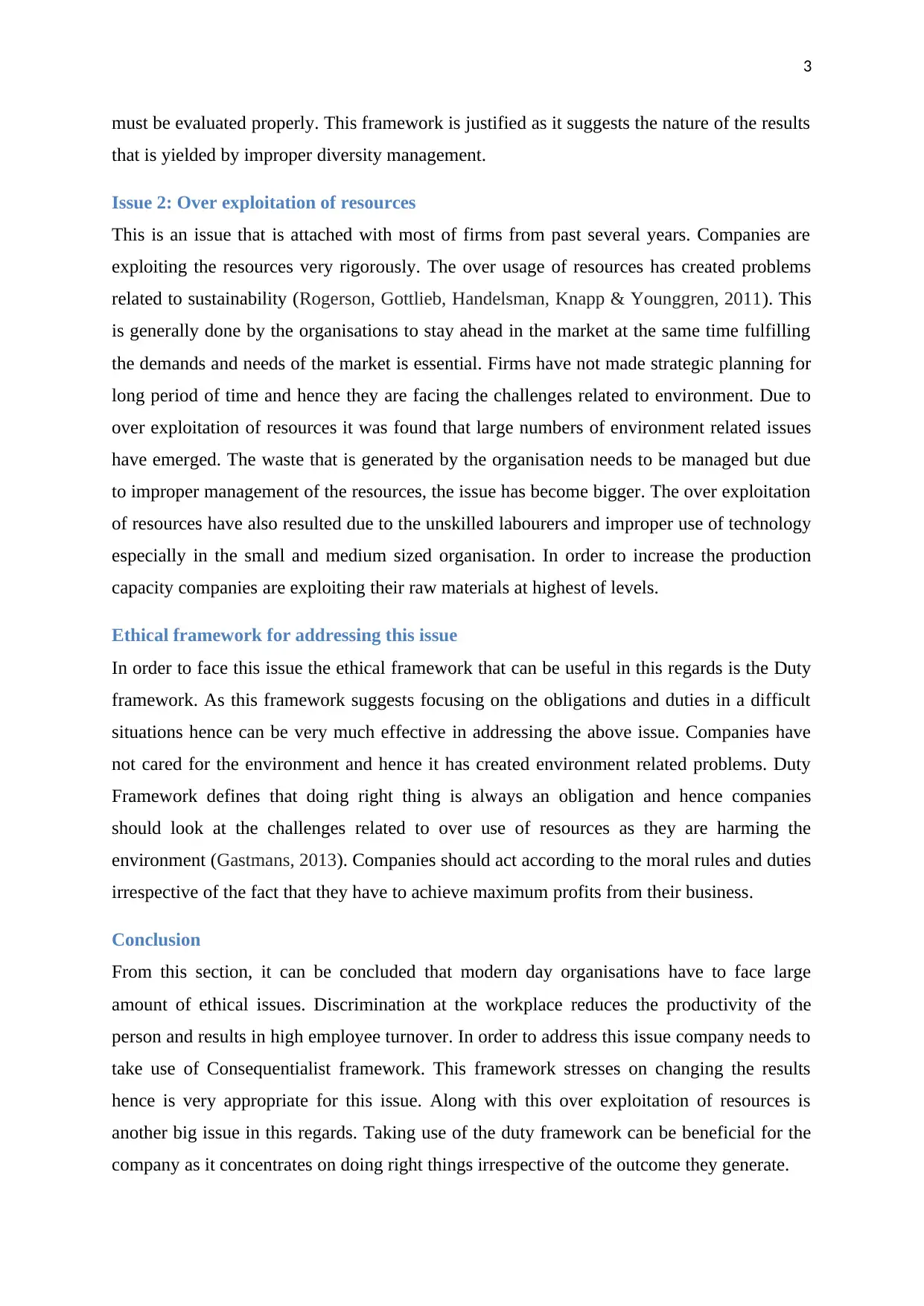
3
must be evaluated properly. This framework is justified as it suggests the nature of the results
that is yielded by improper diversity management.
Issue 2: Over exploitation of resources
This is an issue that is attached with most of firms from past several years. Companies are
exploiting the resources very rigorously. The over usage of resources has created problems
related to sustainability (Rogerson, Gottlieb, Handelsman, Knapp & Younggren, 2011). This
is generally done by the organisations to stay ahead in the market at the same time fulfilling
the demands and needs of the market is essential. Firms have not made strategic planning for
long period of time and hence they are facing the challenges related to environment. Due to
over exploitation of resources it was found that large numbers of environment related issues
have emerged. The waste that is generated by the organisation needs to be managed but due
to improper management of the resources, the issue has become bigger. The over exploitation
of resources have also resulted due to the unskilled labourers and improper use of technology
especially in the small and medium sized organisation. In order to increase the production
capacity companies are exploiting their raw materials at highest of levels.
Ethical framework for addressing this issue
In order to face this issue the ethical framework that can be useful in this regards is the Duty
framework. As this framework suggests focusing on the obligations and duties in a difficult
situations hence can be very much effective in addressing the above issue. Companies have
not cared for the environment and hence it has created environment related problems. Duty
Framework defines that doing right thing is always an obligation and hence companies
should look at the challenges related to over use of resources as they are harming the
environment (Gastmans, 2013). Companies should act according to the moral rules and duties
irrespective of the fact that they have to achieve maximum profits from their business.
Conclusion
From this section, it can be concluded that modern day organisations have to face large
amount of ethical issues. Discrimination at the workplace reduces the productivity of the
person and results in high employee turnover. In order to address this issue company needs to
take use of Consequentialist framework. This framework stresses on changing the results
hence is very appropriate for this issue. Along with this over exploitation of resources is
another big issue in this regards. Taking use of the duty framework can be beneficial for the
company as it concentrates on doing right things irrespective of the outcome they generate.
must be evaluated properly. This framework is justified as it suggests the nature of the results
that is yielded by improper diversity management.
Issue 2: Over exploitation of resources
This is an issue that is attached with most of firms from past several years. Companies are
exploiting the resources very rigorously. The over usage of resources has created problems
related to sustainability (Rogerson, Gottlieb, Handelsman, Knapp & Younggren, 2011). This
is generally done by the organisations to stay ahead in the market at the same time fulfilling
the demands and needs of the market is essential. Firms have not made strategic planning for
long period of time and hence they are facing the challenges related to environment. Due to
over exploitation of resources it was found that large numbers of environment related issues
have emerged. The waste that is generated by the organisation needs to be managed but due
to improper management of the resources, the issue has become bigger. The over exploitation
of resources have also resulted due to the unskilled labourers and improper use of technology
especially in the small and medium sized organisation. In order to increase the production
capacity companies are exploiting their raw materials at highest of levels.
Ethical framework for addressing this issue
In order to face this issue the ethical framework that can be useful in this regards is the Duty
framework. As this framework suggests focusing on the obligations and duties in a difficult
situations hence can be very much effective in addressing the above issue. Companies have
not cared for the environment and hence it has created environment related problems. Duty
Framework defines that doing right thing is always an obligation and hence companies
should look at the challenges related to over use of resources as they are harming the
environment (Gastmans, 2013). Companies should act according to the moral rules and duties
irrespective of the fact that they have to achieve maximum profits from their business.
Conclusion
From this section, it can be concluded that modern day organisations have to face large
amount of ethical issues. Discrimination at the workplace reduces the productivity of the
person and results in high employee turnover. In order to address this issue company needs to
take use of Consequentialist framework. This framework stresses on changing the results
hence is very appropriate for this issue. Along with this over exploitation of resources is
another big issue in this regards. Taking use of the duty framework can be beneficial for the
company as it concentrates on doing right things irrespective of the outcome they generate.
Paraphrase This Document
Need a fresh take? Get an instant paraphrase of this document with our AI Paraphraser
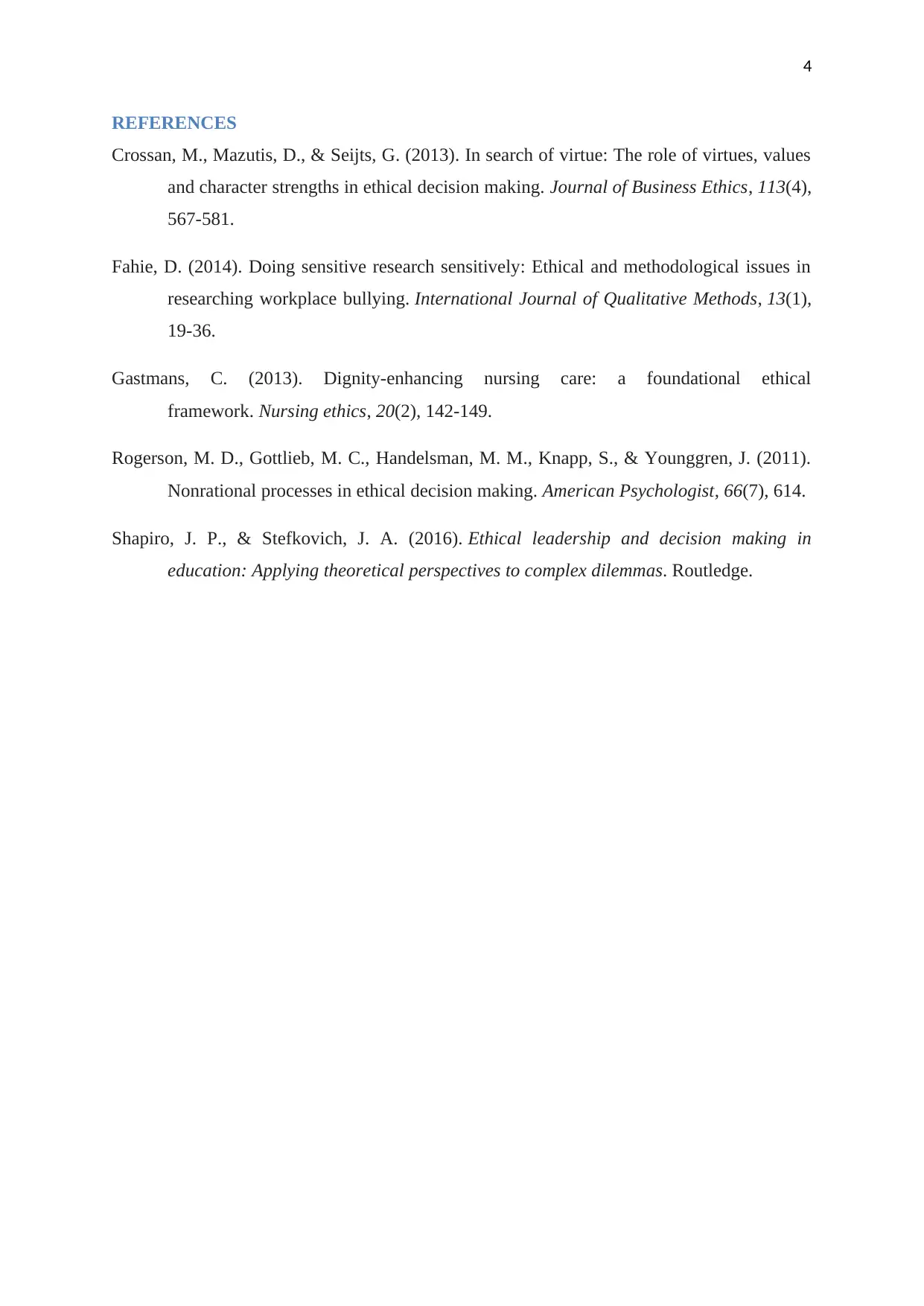
4
REFERENCES
Crossan, M., Mazutis, D., & Seijts, G. (2013). In search of virtue: The role of virtues, values
and character strengths in ethical decision making. Journal of Business Ethics, 113(4),
567-581.
Fahie, D. (2014). Doing sensitive research sensitively: Ethical and methodological issues in
researching workplace bullying. International Journal of Qualitative Methods, 13(1),
19-36.
Gastmans, C. (2013). Dignity-enhancing nursing care: a foundational ethical
framework. Nursing ethics, 20(2), 142-149.
Rogerson, M. D., Gottlieb, M. C., Handelsman, M. M., Knapp, S., & Younggren, J. (2011).
Nonrational processes in ethical decision making. American Psychologist, 66(7), 614.
Shapiro, J. P., & Stefkovich, J. A. (2016). Ethical leadership and decision making in
education: Applying theoretical perspectives to complex dilemmas. Routledge.
REFERENCES
Crossan, M., Mazutis, D., & Seijts, G. (2013). In search of virtue: The role of virtues, values
and character strengths in ethical decision making. Journal of Business Ethics, 113(4),
567-581.
Fahie, D. (2014). Doing sensitive research sensitively: Ethical and methodological issues in
researching workplace bullying. International Journal of Qualitative Methods, 13(1),
19-36.
Gastmans, C. (2013). Dignity-enhancing nursing care: a foundational ethical
framework. Nursing ethics, 20(2), 142-149.
Rogerson, M. D., Gottlieb, M. C., Handelsman, M. M., Knapp, S., & Younggren, J. (2011).
Nonrational processes in ethical decision making. American Psychologist, 66(7), 614.
Shapiro, J. P., & Stefkovich, J. A. (2016). Ethical leadership and decision making in
education: Applying theoretical perspectives to complex dilemmas. Routledge.
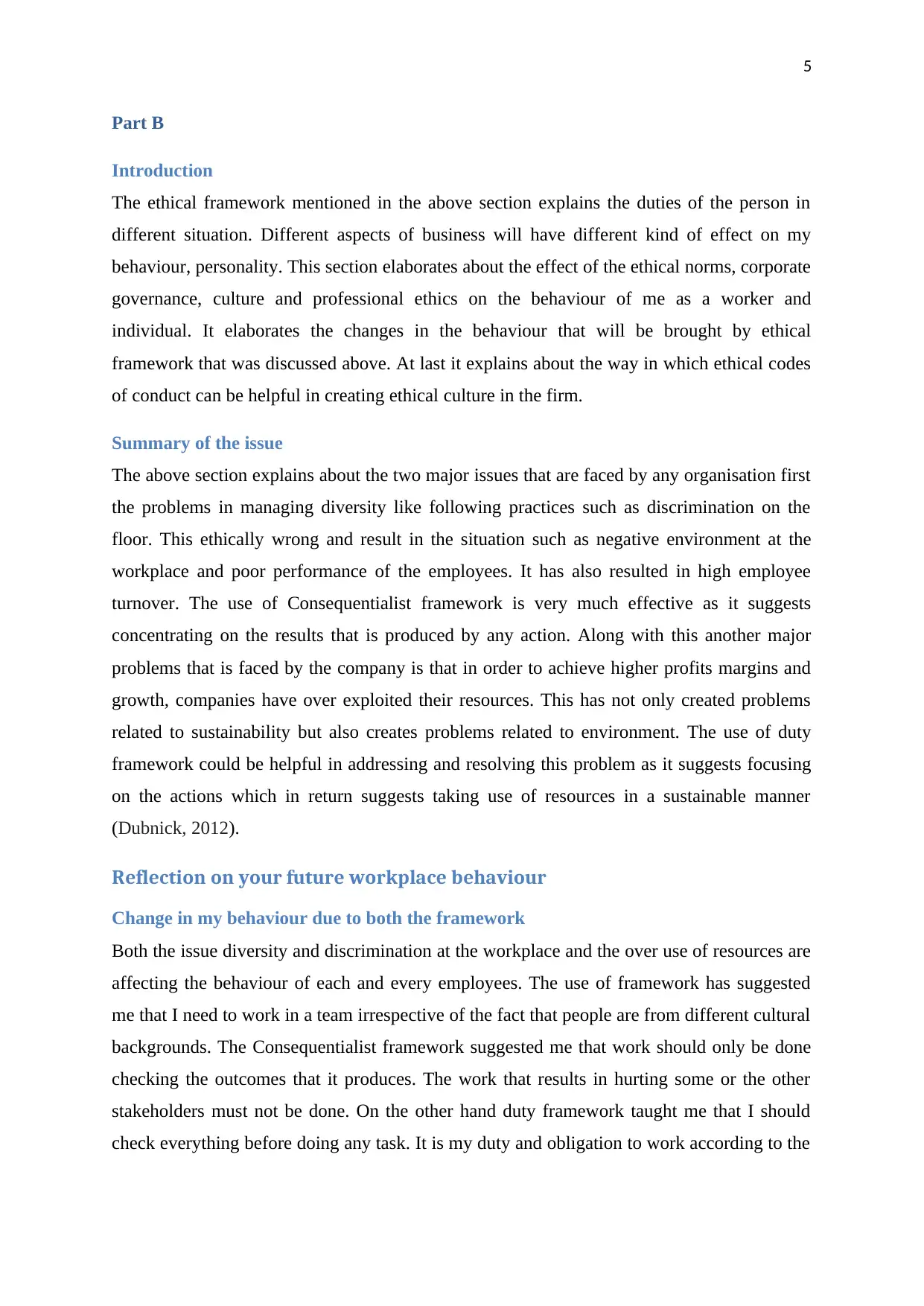
5
Part B
Introduction
The ethical framework mentioned in the above section explains the duties of the person in
different situation. Different aspects of business will have different kind of effect on my
behaviour, personality. This section elaborates about the effect of the ethical norms, corporate
governance, culture and professional ethics on the behaviour of me as a worker and
individual. It elaborates the changes in the behaviour that will be brought by ethical
framework that was discussed above. At last it explains about the way in which ethical codes
of conduct can be helpful in creating ethical culture in the firm.
Summary of the issue
The above section explains about the two major issues that are faced by any organisation first
the problems in managing diversity like following practices such as discrimination on the
floor. This ethically wrong and result in the situation such as negative environment at the
workplace and poor performance of the employees. It has also resulted in high employee
turnover. The use of Consequentialist framework is very much effective as it suggests
concentrating on the results that is produced by any action. Along with this another major
problems that is faced by the company is that in order to achieve higher profits margins and
growth, companies have over exploited their resources. This has not only created problems
related to sustainability but also creates problems related to environment. The use of duty
framework could be helpful in addressing and resolving this problem as it suggests focusing
on the actions which in return suggests taking use of resources in a sustainable manner
(Dubnick, 2012).
Reflection on your future workplace behaviour
Change in my behaviour due to both the framework
Both the issue diversity and discrimination at the workplace and the over use of resources are
affecting the behaviour of each and every employees. The use of framework has suggested
me that I need to work in a team irrespective of the fact that people are from different cultural
backgrounds. The Consequentialist framework suggested me that work should only be done
checking the outcomes that it produces. The work that results in hurting some or the other
stakeholders must not be done. On the other hand duty framework taught me that I should
check everything before doing any task. It is my duty and obligation to work according to the
Part B
Introduction
The ethical framework mentioned in the above section explains the duties of the person in
different situation. Different aspects of business will have different kind of effect on my
behaviour, personality. This section elaborates about the effect of the ethical norms, corporate
governance, culture and professional ethics on the behaviour of me as a worker and
individual. It elaborates the changes in the behaviour that will be brought by ethical
framework that was discussed above. At last it explains about the way in which ethical codes
of conduct can be helpful in creating ethical culture in the firm.
Summary of the issue
The above section explains about the two major issues that are faced by any organisation first
the problems in managing diversity like following practices such as discrimination on the
floor. This ethically wrong and result in the situation such as negative environment at the
workplace and poor performance of the employees. It has also resulted in high employee
turnover. The use of Consequentialist framework is very much effective as it suggests
concentrating on the results that is produced by any action. Along with this another major
problems that is faced by the company is that in order to achieve higher profits margins and
growth, companies have over exploited their resources. This has not only created problems
related to sustainability but also creates problems related to environment. The use of duty
framework could be helpful in addressing and resolving this problem as it suggests focusing
on the actions which in return suggests taking use of resources in a sustainable manner
(Dubnick, 2012).
Reflection on your future workplace behaviour
Change in my behaviour due to both the framework
Both the issue diversity and discrimination at the workplace and the over use of resources are
affecting the behaviour of each and every employees. The use of framework has suggested
me that I need to work in a team irrespective of the fact that people are from different cultural
backgrounds. The Consequentialist framework suggested me that work should only be done
checking the outcomes that it produces. The work that results in hurting some or the other
stakeholders must not be done. On the other hand duty framework taught me that I should
check everything before doing any task. It is my duty and obligation to work according to the
⊘ This is a preview!⊘
Do you want full access?
Subscribe today to unlock all pages.

Trusted by 1+ million students worldwide
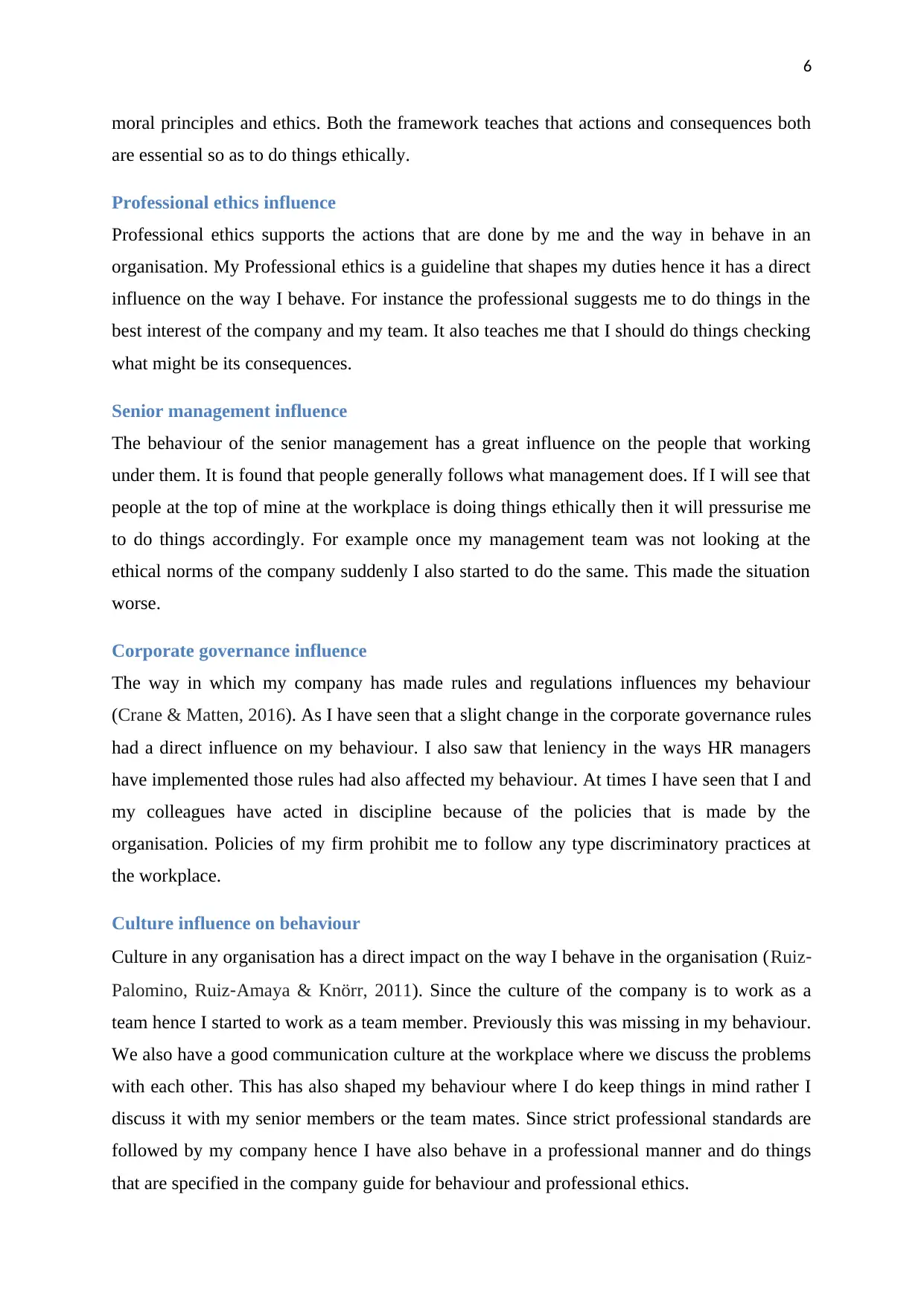
6
moral principles and ethics. Both the framework teaches that actions and consequences both
are essential so as to do things ethically.
Professional ethics influence
Professional ethics supports the actions that are done by me and the way in behave in an
organisation. My Professional ethics is a guideline that shapes my duties hence it has a direct
influence on the way I behave. For instance the professional suggests me to do things in the
best interest of the company and my team. It also teaches me that I should do things checking
what might be its consequences.
Senior management influence
The behaviour of the senior management has a great influence on the people that working
under them. It is found that people generally follows what management does. If I will see that
people at the top of mine at the workplace is doing things ethically then it will pressurise me
to do things accordingly. For example once my management team was not looking at the
ethical norms of the company suddenly I also started to do the same. This made the situation
worse.
Corporate governance influence
The way in which my company has made rules and regulations influences my behaviour
(Crane & Matten, 2016). As I have seen that a slight change in the corporate governance rules
had a direct influence on my behaviour. I also saw that leniency in the ways HR managers
have implemented those rules had also affected my behaviour. At times I have seen that I and
my colleagues have acted in discipline because of the policies that is made by the
organisation. Policies of my firm prohibit me to follow any type discriminatory practices at
the workplace.
Culture influence on behaviour
Culture in any organisation has a direct impact on the way I behave in the organisation (Ruiz‐
Palomino, Ruiz‐Amaya & Knörr, 2011). Since the culture of the company is to work as a
team hence I started to work as a team member. Previously this was missing in my behaviour.
We also have a good communication culture at the workplace where we discuss the problems
with each other. This has also shaped my behaviour where I do keep things in mind rather I
discuss it with my senior members or the team mates. Since strict professional standards are
followed by my company hence I have also behave in a professional manner and do things
that are specified in the company guide for behaviour and professional ethics.
moral principles and ethics. Both the framework teaches that actions and consequences both
are essential so as to do things ethically.
Professional ethics influence
Professional ethics supports the actions that are done by me and the way in behave in an
organisation. My Professional ethics is a guideline that shapes my duties hence it has a direct
influence on the way I behave. For instance the professional suggests me to do things in the
best interest of the company and my team. It also teaches me that I should do things checking
what might be its consequences.
Senior management influence
The behaviour of the senior management has a great influence on the people that working
under them. It is found that people generally follows what management does. If I will see that
people at the top of mine at the workplace is doing things ethically then it will pressurise me
to do things accordingly. For example once my management team was not looking at the
ethical norms of the company suddenly I also started to do the same. This made the situation
worse.
Corporate governance influence
The way in which my company has made rules and regulations influences my behaviour
(Crane & Matten, 2016). As I have seen that a slight change in the corporate governance rules
had a direct influence on my behaviour. I also saw that leniency in the ways HR managers
have implemented those rules had also affected my behaviour. At times I have seen that I and
my colleagues have acted in discipline because of the policies that is made by the
organisation. Policies of my firm prohibit me to follow any type discriminatory practices at
the workplace.
Culture influence on behaviour
Culture in any organisation has a direct impact on the way I behave in the organisation (Ruiz‐
Palomino, Ruiz‐Amaya & Knörr, 2011). Since the culture of the company is to work as a
team hence I started to work as a team member. Previously this was missing in my behaviour.
We also have a good communication culture at the workplace where we discuss the problems
with each other. This has also shaped my behaviour where I do keep things in mind rather I
discuss it with my senior members or the team mates. Since strict professional standards are
followed by my company hence I have also behave in a professional manner and do things
that are specified in the company guide for behaviour and professional ethics.
Paraphrase This Document
Need a fresh take? Get an instant paraphrase of this document with our AI Paraphraser
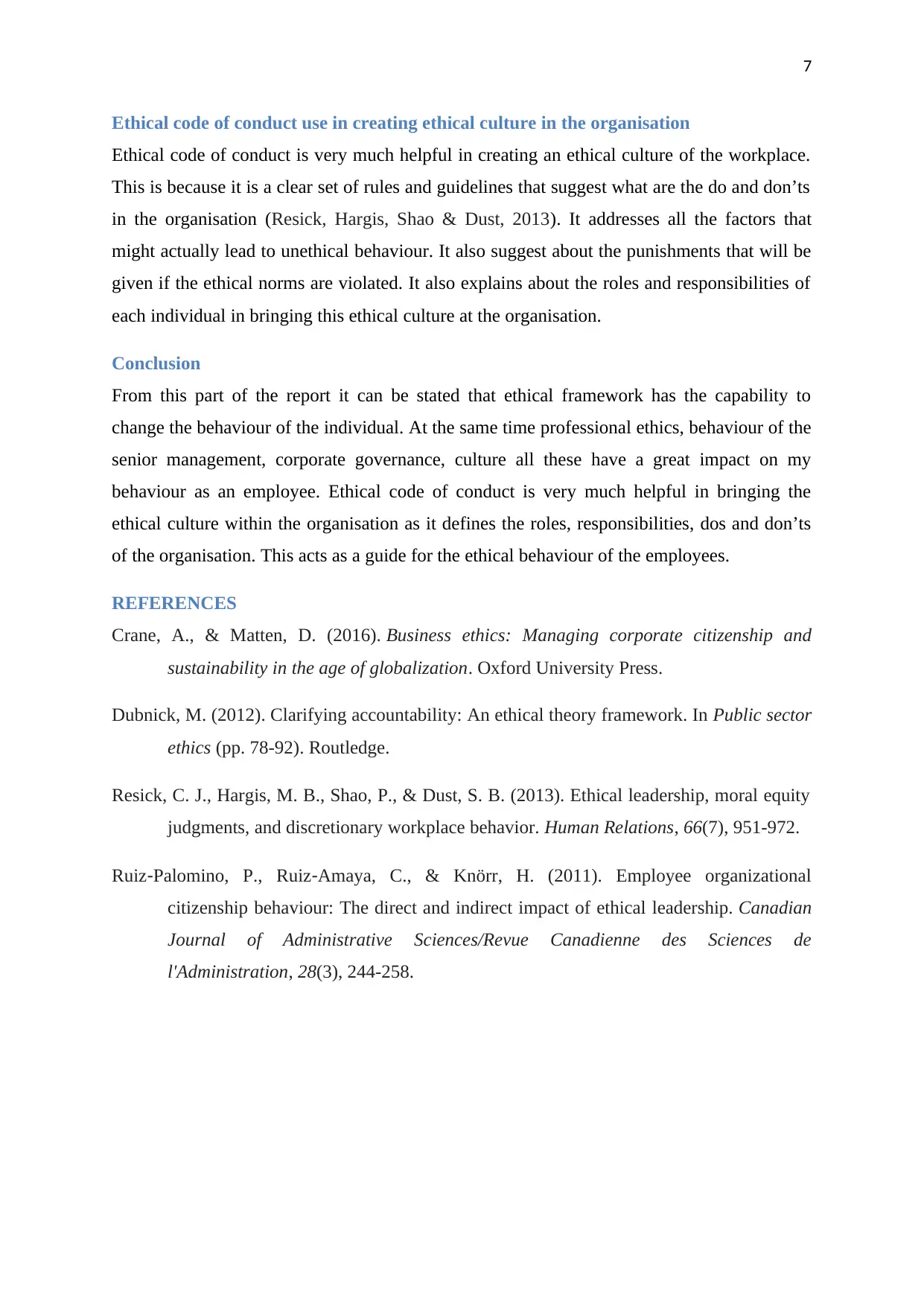
7
Ethical code of conduct use in creating ethical culture in the organisation
Ethical code of conduct is very much helpful in creating an ethical culture of the workplace.
This is because it is a clear set of rules and guidelines that suggest what are the do and don’ts
in the organisation (Resick, Hargis, Shao & Dust, 2013). It addresses all the factors that
might actually lead to unethical behaviour. It also suggest about the punishments that will be
given if the ethical norms are violated. It also explains about the roles and responsibilities of
each individual in bringing this ethical culture at the organisation.
Conclusion
From this part of the report it can be stated that ethical framework has the capability to
change the behaviour of the individual. At the same time professional ethics, behaviour of the
senior management, corporate governance, culture all these have a great impact on my
behaviour as an employee. Ethical code of conduct is very much helpful in bringing the
ethical culture within the organisation as it defines the roles, responsibilities, dos and don’ts
of the organisation. This acts as a guide for the ethical behaviour of the employees.
REFERENCES
Crane, A., & Matten, D. (2016). Business ethics: Managing corporate citizenship and
sustainability in the age of globalization. Oxford University Press.
Dubnick, M. (2012). Clarifying accountability: An ethical theory framework. In Public sector
ethics (pp. 78-92). Routledge.
Resick, C. J., Hargis, M. B., Shao, P., & Dust, S. B. (2013). Ethical leadership, moral equity
judgments, and discretionary workplace behavior. Human Relations, 66(7), 951-972.
Ruiz‐Palomino, P., Ruiz‐Amaya, C., & Knörr, H. (2011). Employee organizational
citizenship behaviour: The direct and indirect impact of ethical leadership. Canadian
Journal of Administrative Sciences/Revue Canadienne des Sciences de
l'Administration, 28(3), 244-258.
Ethical code of conduct use in creating ethical culture in the organisation
Ethical code of conduct is very much helpful in creating an ethical culture of the workplace.
This is because it is a clear set of rules and guidelines that suggest what are the do and don’ts
in the organisation (Resick, Hargis, Shao & Dust, 2013). It addresses all the factors that
might actually lead to unethical behaviour. It also suggest about the punishments that will be
given if the ethical norms are violated. It also explains about the roles and responsibilities of
each individual in bringing this ethical culture at the organisation.
Conclusion
From this part of the report it can be stated that ethical framework has the capability to
change the behaviour of the individual. At the same time professional ethics, behaviour of the
senior management, corporate governance, culture all these have a great impact on my
behaviour as an employee. Ethical code of conduct is very much helpful in bringing the
ethical culture within the organisation as it defines the roles, responsibilities, dos and don’ts
of the organisation. This acts as a guide for the ethical behaviour of the employees.
REFERENCES
Crane, A., & Matten, D. (2016). Business ethics: Managing corporate citizenship and
sustainability in the age of globalization. Oxford University Press.
Dubnick, M. (2012). Clarifying accountability: An ethical theory framework. In Public sector
ethics (pp. 78-92). Routledge.
Resick, C. J., Hargis, M. B., Shao, P., & Dust, S. B. (2013). Ethical leadership, moral equity
judgments, and discretionary workplace behavior. Human Relations, 66(7), 951-972.
Ruiz‐Palomino, P., Ruiz‐Amaya, C., & Knörr, H. (2011). Employee organizational
citizenship behaviour: The direct and indirect impact of ethical leadership. Canadian
Journal of Administrative Sciences/Revue Canadienne des Sciences de
l'Administration, 28(3), 244-258.
1 out of 8
Related Documents
Your All-in-One AI-Powered Toolkit for Academic Success.
+13062052269
info@desklib.com
Available 24*7 on WhatsApp / Email
![[object Object]](/_next/static/media/star-bottom.7253800d.svg)
Unlock your academic potential
Copyright © 2020–2025 A2Z Services. All Rights Reserved. Developed and managed by ZUCOL.




